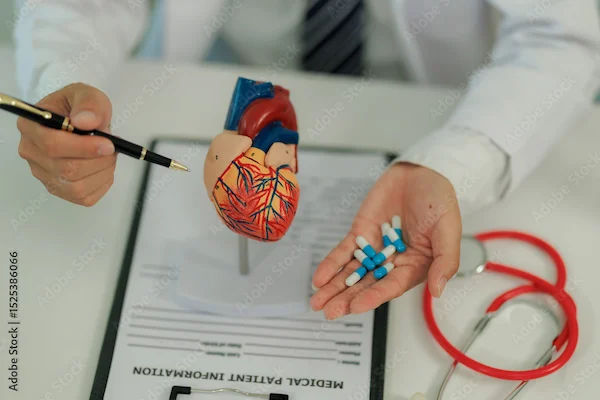- male
- 27 Years
- 20/02/2025
I'm a 27-year-old male, and I've been having some pain on the left side of my chest along with pain in my upper back and sometimes in the left side of my neck. It's been a real mixed bagsometimes it's a dull ache, other times it's much worse. About a month ago, I had an ECG, ECHO, and TMT done, and everything came back normal. My lipid profile and high-sensitive troponin levels were normal too, and even my chest X-ray didn't show anything unusual. But this has been going on for the last 10 months now. I'm trying to figure out if this pain might be related to my heart, my lungs, a muscle issue, or maybe just gas. Should I think about repeating the heart-related tests, or what do you recommend as the next step?
Answered by 1 Apollo Doctors
"Based on your symptoms and the normal results of your previous heart-related tests, it is less likely that the pain is heart-related. The pain in your left chest, left upper back, and neck could be musculoskeletal in nature, possibly due to muscle strain or inflammation. It could also be related to gas or indigestion. To help alleviate your symptoms, you can try taking over-the-counter pain relievers such as acetaminophen and applying heat or ice to the affected areas. Additionally, practicing good posture and gentle stretching exercises may also provide some relief. If the pain persists or worsens, you may consider consulting a doctor for further evaluation. They may recommend physical therapy, muscle relaxants, or other medications such as ibuprofen for pain and inflammation. It is not necessary to repeat the heart-related tests at this point, given your recent normal results. However, if you experience any new or concerning symptoms, it is important to seek medical advice promptly."
Dr. Ibrahim Suggests...
Consult a Cardiologist
Answered 04/07/2025
0
0

Ask Apollo
AI powered Health Chatbot
-
Reassess Symptoms: a. Monitor for any new symptoms like shortness of breath, dizziness, or increased pain. b. Note any triggers or patterns in the pain.
-
Consider Musculoskeletal Causes: a. Evaluate posture and recent physical activities. b. Try over-the-counter pain relief and gentle stretching exercises.
-
Consultation: a. Schedule a follow-up with a primary care physician or a cardiologist. b. Discuss the possibility of non-cardiac causes such as musculoskeletal or gastrointestinal issues.
-
Lifestyle Modifications: a. Maintain a balanced diet and regular exercise. b. Manage stress through relaxation techniques.
-
Further Testing: a. Consider imaging like a CT scan if symptoms persist. b. Explore referral to a specialist if no improvement.
Recommended next steps
Consult a Family Physician or Consult a Cardiologist
Answered 10/09/2025
0
0

More Cardiology Health Queries
View allI've been feeling this annoying itchy sensation at the bottom of my heart, kind of towards the back, and it's been bugging me. I'm also always hungry and feeling this slight heartburn, which just adds to the discomfort. It's weird because I can't seem to breathe as deeply as I usually do. Could this be something serious? Should I be worried?
cardiac markers and ecg is advised tothe patient. Advised tab levocetrizine ,orally at night for 5 days.
Answered by 1 Apollo Doctors
I recently started feeling some pain on the left side of my chest and it made me really anxious, so I went to the hospital. The doctor had me do an ECG and a 2D Echo. According to the reports, the doctor said my heart is normal. Can you please take a look at my reports and provide your thoughts on them? I'm still a bit worried and could use some advice.
"Sir, based on the ECG and 2D Echo reports that you have provided, which indicate that your heart is normal, it is good news that there are no abnormalities detected in your heart. The pain in the left side of your chest could be due to various reasons such as muscle strain, acid reflux, or anxiety. To alleviate the pain, you can take over-the-counter pain relievers like Acetaminophen 500mg as needed for pain relief. Additionally, practicing relaxation techniques and deep breathing exercises may help with the panic and anxiety symptoms. If the pain persists or worsens, it is advisable to follow up with your doctor for further evaluation. Take care."
Answered by 1 Apollo Doctors
I'm 32 years old and recently had an ECG done for my ICL eye surgery. It's showing a heart rate between 120 to 127. I havent had any health issues or heart pain for the past five years, and I've been getting full body checks regularly since I was 27, which consistently show my heart rate in the 120 range. Is this something I should be really concerned about, and is it safe to go ahead with the ICL eye surgery? My report is attached. What should I do?
You have a consistently high heart rate around 120 range for the past 5 years without any health issues or abnormalities. This may be normal for you, especially if you are physically active or have a naturally high heart rate. However, it is important to further evaluate the cause of your elevated heart rate to ensure it is not due to any underlying medical condition. Considering you are planning to proceed with ICL eye surgery, it would be advisable to consult with a cardiologist to assess your heart health and determine if any further investigations or treatment are necessary before undergoing the surgery. The cardiologist may recommend medications such as Metoprolol to help lower your heart rate if needed. It is important to address any potential cardiac issues before proceeding with surgery to ensure your safety and well-being
Answered by 1 Apollo Doctors
Disclaimer: Answers on Apollo 247 are not intended to replace your doctor advice. Always seek help of a professional doctor in case of an medical emergency or ailment.

_1.webp)

